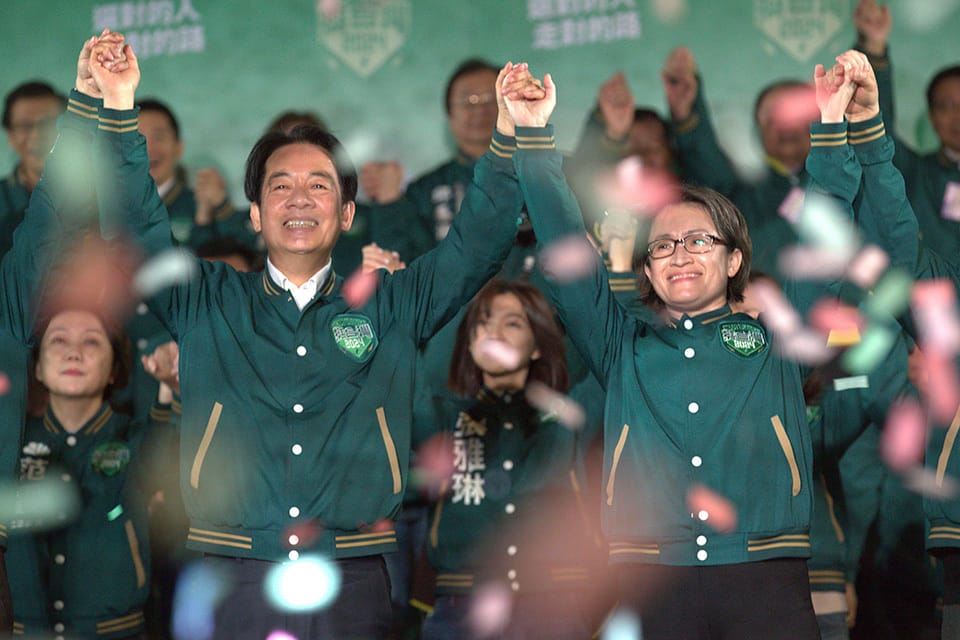Report Published February 7, 2024 · 6 minute read
Washington's and Taiwan's Diverging Interests Doesn't Make War Imminent
Shirley Martey Hargis

We are a month from the Taiwan 2024 election that sent shockwaves around the world. President-elect, Lai Ching-te (賴清德), dared to utter the world ‘independence” in a strike against the longstanding One China Policy (一个中国政策) in his successful campaign to lead the nation. The election was important enough for an increasingly assertive President Xi Jinping (习近平出席) to try (and fail) to influence the election’s outcome. Xi has been rattling cages for the last several years and has made no secret of his desire to bring Taiwan under Beijing’s thumb without explicitly ruling out the use of force. Meanwhile, a busy President Biden has had his hands full keeping allies committed to Ukraine, battling Putin-sympathetic members of Congress, while also dealing with cascading crises in Israel and the Middle East.
With that as our backdrop, does Lai’s election, Xi’s frustration, and Biden’s preoccupation mean we are closer to conflict in the Taiwan Strait? In this brief analysis we argue that at present the answer is “no.” And we make this call by looking at the vantage points and early actions of each country. For America, the Taiwan election has put the country on alert. For Taiwan, domestic concerns are mainly driving voters – not cross-Strait policy. For the People’s Republic of China (PRC; 中华人民共和国), ignore the rhetoric because they’ve followed their Taiwan election disappointment by returning to their standard playbook.1 But stay tuned…. perhaps they’re saving the fireworks for Lai’s May 20 inauguration.
Washington: On Alert
Taiwan’s fate is in the bloodstream of America’s national security. A cross-Strait war would have catastrophic implications for the world economy, Americans’ prosperity, a delicately balanced international order as well as the future of democracy.2 Taiwan is the first and only Chinese democracy, showcasing that Chinese culture and respect for human rights can coexist, which is crucial in deterring the effectiveness of Beijing’s exporting authoritarianism.3 Geographically, Taiwan is a key node within the first island chain, harboring a coalition of U.S. allies and partners critical to the region’s security and defense of U.S. interests in the Indo-Pacific. Allies would be susceptible to aligning with Beijing due to lost confidence in America’s defense and security commitments should America not react to an invasion with insufficient force.
With the continued rapid acceleration of technological advancements, a war could mean the loss of the Taiwan Semiconductor Manufacturing Company (TSMC)4. Four of nine of the world’s largest foundries are based in Taiwan (68 percent of the market).5 War could readily surpass the economic impact of the 2008 global financial crisis or the 2020 COVID lockdown.6 TSMC produces 90 percent of the world’s advanced chips that are key to emerging technologies.7 Regardless of a successful annexation or a US intervention, a PRC attack would trigger a catastrophic global economic depression, resulting in unintended waves depleting trillions of dollars of global economic output.8
Taiwan: Mundane Concerns
Cross-Strait tensions are never far from Taiwan voters’ minds, but local politics and local issues typically define the island’s elections, and this one was no exception. This is a clear divergence from the typical Western lens. This latest election hinged on long-standing domestic issues like healthcare, energy, good governance, and the economy. Ironically, TSMC’s business success has significantly raised housing prices, making homeownership less obtainable.9 Nine out of 10 Taiwan workers are displeased with their current salaries.10 In this election, various youth groups aligned themselves with the new Taiwan People’s Party (TPP; 台灣民眾黨), focused on institutional change, because they were fed up with both Lai’s Democratic Progressive Party (DPP; 民主進步黨) and Hou Yu-uh’s (侯友谊) Kuomintang (KMT; 中國國民黨) and their inability to improve their lives. President Lai likely would not have won had Ko Wen-je of the Taiwan People’s Party not failed to run a joint ticket with the KMT.11 And either of these parties, who together won 60 percent of the vote, were preferable to Beijing.
Beijing: The Standard Playbook
Since the election, China has reacted strongly, but not too strongly. For example, while there was some saber rattling and a few explicit actions (convincing the island of Nairu to end diplomatic ties with Taiwan, now ten countries since President Tsai’s first term in 2016), everything else has felt more like the standard PRC playbook – for now.12
Financially, we haven’t seen Xi freeze cross-border capital controls, initiate rapid liquidation, or repatriate global assets.13 The regime hasn’t halted the exporting of critical minerals and food or implemented measures to ration goods. International governments haven’t noticed a surge in munitions production for amphibious, naval, and air warfare. U.S. intelligence leaks are rarely accidental and there have been none to raise alarms. Had Xi planned to attack Taiwan before the recent elections, American intelligence would have leaked warnings months prior, similar to Ukraine-Russia war-related actions.14
Instead, we’re seeing a more diplomatic tone from Beijing. President Xi brought a huge congregation of officials to Davos to speak with global business leaders. Xi is seeking more foreign direct investment to stop the bleeding as China’s real estate market (30 percent of GDP) veers toward collapse.15 China’s economy is suffering and domestically, Xi is confronted with his populace losing confidence in his ability to maintain his economic promise. Record youth unemployment coupled with Xi’s ‘Great Firewall’ prevent eager blossoming online influencers from profiting from the market that global internet sensations created.16 For now, Xi is drowning in military corruption and launching a corruption operation to show dedication to the unprecedented Anti-Corruption campaign that had initially brought him favoritism.17
And ultimately, for Xi, Taiwan is not lost because of this election. Lai won just 40 percent of the vote, the lowest percentage for a winning candidate since 2000.18 Last January, during then-Vice President Lai’s swearing in as the DPP’s chairman, he said that Taiwan is already sovereign so there is no need to declare independence.19 Following his presidential win, though, he quickly announced he would maintain the status quo.20
Beijing is not above using the dark underbelly of organized crime to discreetly move the needle to arm and prepare for a war without many scholars or politicians taking note. If Xi made a move, he’d use illicit supply chain markets.21 Smugglers are pros at moving reserves around the world, preferable to the military that would be easily identified by intelligence agencies. Despite the internet scraping of ‘1000 talents program’ and ‘triads,’ both concepts remain active.22 We expect the Russians to brashly employ illicit tactics, but not Beijing because of its complexity.23 Expect a sophisticated hybrid of legitimate political means and illicit means.
We’re keeping a watchful eye on the Taiwan Strait, but the status quo seems to be winning out – for now.
